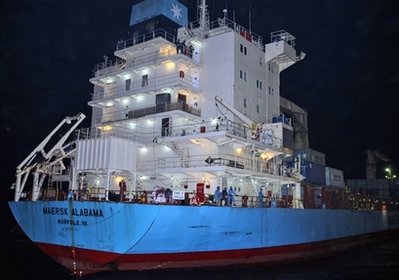US ship thwarts second pirate attack
NAIROBI, Kenya: Somali pirates attacked the Maersk Alabama on Wednesday for the second time in seven months, though private guards on board the US-flagged ship repelled the attack with gunfire and a high-decibel noise device.
A US surveillance plane was monitoring the ship as it continued to its destination on the Kenyan coast, while a pirate said that the captain of a ship hijacked Monday with 28 crew members from the Democratic People's Republic of Korea (DPRK) on board had died of wounds.
Pirates hijacked the Maersk Alabama last April and took ship captain Richard Phillips hostage, holding him at gunpoint in a lifeboat for five days. Navy SEAL sharpshooters freed Phillips while killing three pirates in a daring nighttime attack.
Four suspected pirates in a skiff attacked the ship again on Wednesday around 6:30 am local time, firing on the ship with automatic weapons from about 300 yards (meters) away, a statement from the US Fifth Fleet in Bahrain said.
An on-board security team repelled the attack by using evasive maneuvers, small-arms fire and a Long Range Acoustic Device, which can beam earsplitting alarm tones, the fleet said.
Vice Adm. Bill Gortney of the US Naval Forces Central Command, said the Maersk Alabama had followed the maritime industry's "best practices" in having a security team on board.
"This is a great example of how merchant mariners can take proactive action to prevent being attacked and why we recommend that ships follow industry best practices if they're in high-risk areas," Gortney said in a statement.
However, Roger Middleton, a piracy expert at the London-based think tank Chatham House, said the international maritime community was still "solidly against" armed guards aboard vessels at sea, but that American ships have taken a different line than the rest of the international community.
"Shipping companies are still pretty much overwhelmingly opposed to the idea of armed guards," Middleton said. "Lots of private security companies employee people who don't have maritime experience. Also, there's the idea that it's the responsibility of states and navies to provide security. I would think it's a step backward if we start privatizing security of the shipping trade."
A Massachusetts Maritime Academy professor, who is also the father of a sailor who was on the Maersk Alabama during the first pirate attack in April, said about 20 percent of the ships off East Africa are armed.
The owners of the Maersk Alabama have spent a considerable amount of money since the April hijacking to make the vessel pirate-proof, Murphy said, including structural features and safety equipment. The most dramatic change is what he called a security force of "highly trained ex-military personnel."
"Somali pirates understand one thing and only one thing, and that's force," said Capt. Joseph Murphy, who teaches maritime security at the school. "They analyze risk very carefully, and when the risk is too high they are going to step back. They are not going to jeopardize themselves."
The wife of the Maersk Alabama's captain, Paul Rochford, told WBZ-AM radio in Boston that she was "really happy" there were weapons on board for this attack.
"It probably surprised the pirates. They were probably shocked," Kimberly Rochford. "I'm really happy at least it didn't turn out like the last time."
A self-proclaimed pirate told The Associated Press from the Somali pirate town of Haradhere that colleagues out at sea had called around 9 am — 2 1/2 hours after the attack.






















